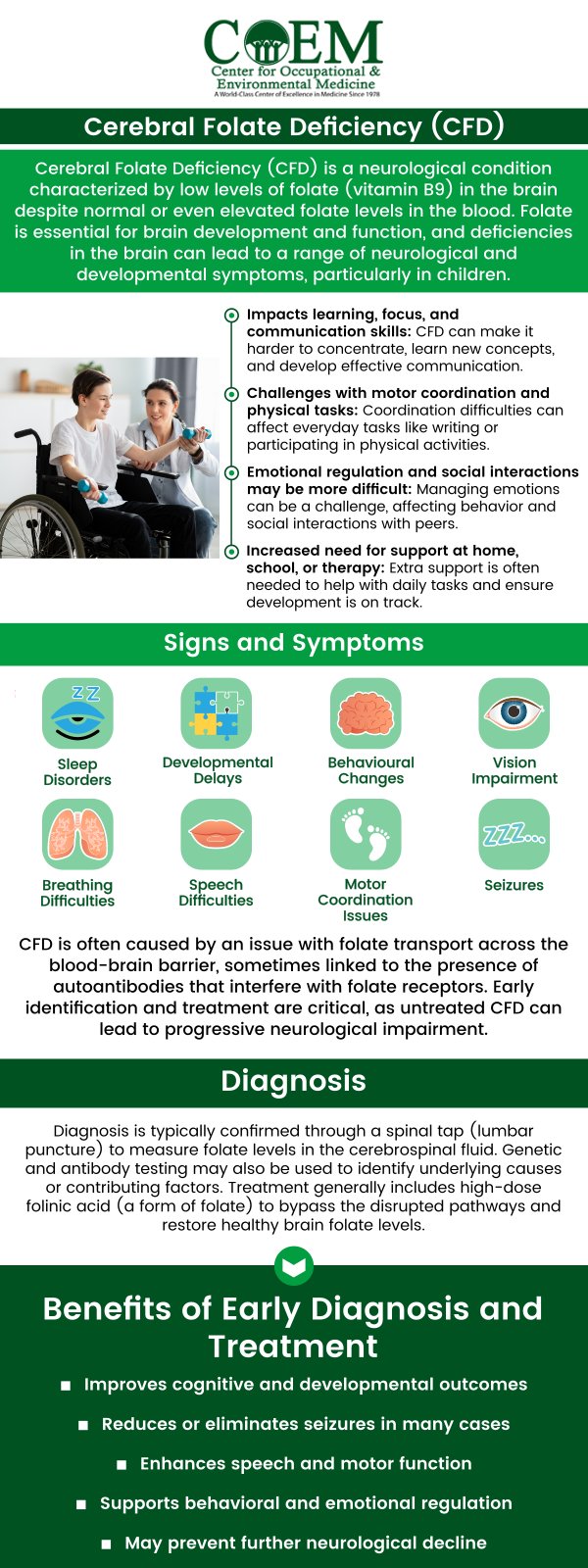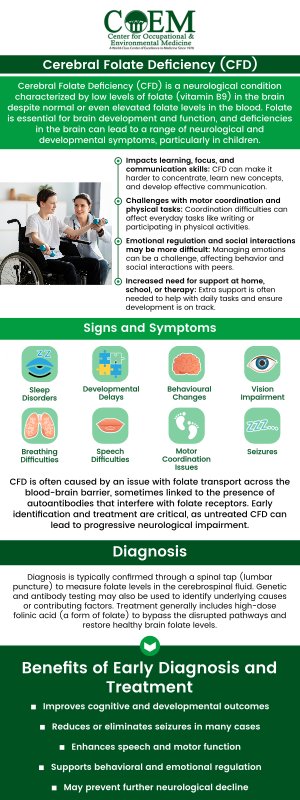Understanding Cerebral Folate Deficiency Symptoms
Understanding Cerebral Folate Deficiency Symptoms involves recognizing how low folate levels in the brain can affect development and behavior. Children may experience delayed speech, cognitive challenges, motor coordination issues, and mood changes. Early identification and care from Board-Certified Dr. Stephen P. Elliott, MD, D.A.B.F.M., F.A.A.A.M., F.M.A.P.S. at The Center for Occupational and Environmental Medicine (COEM) in Charleston, SC, can help improve long-term neurological outcomes. For more information, contact us today or schedule an appointment online. We are conveniently located at 7510 North Forest Drive North Charleston, SC 29420. Patients routinely fly in to be evaluated by COEM, as we serve patients internationally. Find out if you have been exposed, extensive lab testing is available.


Table of Contents:
What are the common symptoms of cerebral folate deficiency?
How does cerebral folate deficiency impact behavior in children?
Are there any early signs of cerebral folate deficiency in infants?
How is cerebral folate deficiency diagnosed through symptoms?
Can adults experience symptoms of cerebral folate deficiency?
How does MedMAPS-Certified Physician Dr. Stephen P. Elliott, MD, approach cerebral folate deficiency diagnosis and treatment?
Cerebral folate deficiency (CFD) occurs when there are abnormally low levels of 5-methyltetrahydrofolate (5-MTHF) — the active form of folate — in the cerebrospinal fluid (CSF), even when blood folate levels are normal or elevated. Folate (vitamin B9) is vital for brain development, neurological signaling, and DNA methylation, making it essential for healthy nerve and cognitive function. When folate transport into the brain is impaired, neurological and developmental symptoms can emerge, typically beginning in infancy or early childhood but sometimes later in life.
Common symptoms of cerebral folate deficiency include delayed speech or language development, cognitive decline or learning difficulties, and motor coordination problems such as ataxia or tremors. Patients may also present with developmental regression, seizures, irritability, behavioral or mood changes, sleep disturbances, and, in some cases, slowed head growth or visual and hearing problems. The severity and combination of symptoms often depend on the underlying cause and age at onset.
At The Center for Occupational and Environmental Medicine (COEM), specialists carefully assess patients who may have overlapping signs with other neurological or developmental disorders, such as autism spectrum disorder or mitochondrial dysfunction. Because CFD can mimic these conditions, accurate testing—particularly CSF 5-MTHF analysis and, if indicated, folate receptor antibody or FOLR1 gene testing—is crucial. Early identification allows for targeted treatment with folinic acid and supportive therapies to help restore normal folate metabolism and improve neurological outcomes.
Cerebral folate deficiency (CFD) can significantly affect a child’s behavior, mood, and emotional regulation due to its impact on neurotransmitter synthesis and brain connectivity. Folate is essential for producing key neurotransmitters such as serotonin, dopamine, and norepinephrine, which help regulate mood, attention, and impulse control. When folate activity in the central nervous system is reduced, communication between neurons becomes disrupted, leading to noticeable behavioral and emotional changes.
Children with CFD may experience increased irritability, anxiety, mood swings, or difficulty focusing. They may also struggle with self-regulation, social interactions, and adaptability in new or structured environments. Some children become withdrawn, easily frustrated, or emotionally reactive, while others may exhibit hyperactive or impulsive behaviors. These behavioral symptoms often occur alongside cognitive delays, speech difficulties, and learning challenges, which can compound their impact on daily life and school performance.
At The Center for Occupational and Environmental Medicine (COEM), clinicians evaluate these behavioral patterns within the broader framework of neurological and metabolic development. By identifying folate-related dysfunction early, specialists can recommend targeted interventions, including nutritional and metabolic support, to help improve mood stability, focus, and overall behavioral functioning.
In infants, cerebral folate deficiency (CFD) may first present with subtle developmental or neurological signs that gradually become more noticeable as milestones are missed. Early symptoms can include low muscle tone (hypotonia), feeding difficulties, poor coordination, or delays in rolling over, sitting, or crawling. As development progresses, infants may begin to show delayed speech, slower cognitive growth, and reduced responsiveness to their environment. Some infants also display unusual movements, tremors, or increased irritability, reflecting underlying disruptions in neurological function.
In more pronounced cases, seizures, abnormal eye movements, or deceleration of head growth may develop, indicating deeper involvement of the central nervous system. Because these early manifestations can resemble other neurological or metabolic conditions, accurate diagnosis requires specialized testing. The most reliable method involves measuring 5-methyltetrahydrofolate (5-MTHF) levels in the cerebrospinal fluid (CSF) obtained via a lumbar puncture (spinal tap). At The Center for Occupational and Environmental Medicine (COEM), specialists emphasize early recognition and intervention, as timely treatment with folinic acid and supportive care can significantly improve long-term cognitive, speech, and motor outcomes in affected children.
While the symptoms of cerebral folate deficiency can provide valuable insight, a formal diagnosis relies on targeted medical testing to confirm low levels of folate in the cerebrospinal fluid. This process typically involves a lumbar puncture to measure 5-methyltetrahydrofolate concentrations directly within the central nervous system. In some cases, additional testing, such as antibody screening or genetic evaluation, may help identify the cause of disrupted folate transport or metabolism. Specialists also take into account neurological, cognitive, and motor function. Common indicators such as developmental delay, speech impairment, and behavioral changes often point toward the possibility of cerebral folate deficiency, particularly when standard blood tests for folate return normal results. By combining laboratory data with detailed clinical observations, a clear and accurate diagnosis can be reached.
Once the diagnosis is confirmed, treatment can begin immediately. High-dose folinic acid therapy is often used to replenish folate levels in the brain, improving symptoms and helping prevent further neurological decline.
Although cerebral folate deficiency is most often identified in children, adults can also experience symptoms if folate metabolism or transport is disrupted later in life. In adults, the condition can present with neurological and psychiatric features such as cognitive decline, depression, fatigue, or difficulty concentrating. Some individuals may also experience neuropathy, coordination problems, or worsening mood disorders that do not respond to standard treatments.
As with pediatric cases, blood tests may show normal or elevated folate levels, which can make diagnosis more challenging. Adults with chronic inflammation, autoimmune conditions, or a history of toxin exposure may be at greater risk for developing deficiencies in the brain’s folate system.
Board Certified Dr. Stephen P. Elliott, MD, D.A.B.F.M., F.A.A.A.M., F.M.A.P.S., a MedMAPS-Certified Physician Fellow, is recognized for his specialized expertise in evaluating and managing cerebral folate deficiency (CFD) and other complex neurodevelopmental and metabolic conditions. As the only MedMAPS-Certified physician at this level in the region, Dr. Elliott brings an advanced, integrative approach to diagnosis and treatment. Working in collaboration with the multidisciplinary team at The Center for Occupational and Environmental Medicine (COEM), he conducts a thorough, individualized evaluation that begins with a detailed review of the patient’s neurological function, developmental progress, and clinical history. His process integrates comprehensive laboratory testing to uncover the root cause of folate disruption—such as autoantibodies to folate receptors, genetic mutations affecting folate transport, or metabolic imbalances that alter brain folate utilization.
Through precise interpretation of diagnostic data, including cerebrospinal fluid 5-MTHF levels, immune profiles, and genetic markers, Dr. Stephen P. Elliott, MD, develops a personalized care plan that focuses on restoring healthy folate metabolism and supporting overall neurological function. His approach emphasizes addressing the root causes of cerebral folate disruption rather than treating isolated symptoms.
At The Center for Occupational and Environmental Medicine (COEM), Dr. Elliott combines his clinical expertise with advanced testing to guide each patient’s individualized protocol. By supporting the body’s natural biochemical pathways and optimizing brain health, his goal is to improve cognitive clarity, behavior, and developmental progress over time. Families from across the country and internationally seek out Dr. Elliott for his comprehensive, evidence-informed approach to complex neurodevelopmental and metabolic conditions, grounded in the principles of functional and precision medicine.
Cerebral folate deficiency treatment is available at The Center for Occupational and Environmental Medicine (COEM). For more information, contact us today or schedule an appointment online. We are conveniently located at 7510 North Forest Drive North Charleston, SC 29420. We serve patients from Charleston SC, Mount Pleasant SC, Summerville SC, North Charleston SC, Goose Creek SC, Ladson SC, Hanahan SC, James Island SC, John’s Island SC, Daniel Island SC, West Ashley SC, Moncks Corner SC, Sullivans Island SC, Folly Beach SC, Isle of Palms SC and all of South Carolina, Nationally, and Internationally. Patients routinely fly into Charleston to be evaluated by COEM and to enjoy this beautiful city, which is a Condé Nast and Travel and Leisure Top Domestic and International Tourist Destination.

Check Out Our 5 Star Reviews


Additional Services You May Like
- Functional Medicine
- Allergy and Autoimmunity
- Asthma and COPD
- Autoimmune Diseases
- Allergy and Immunology
- Anti Aging Medicine
- Autism and Children
- ADHD
- Bacterial Infections
- Chemical Toxicity
- Candida Fungal Problems
- Cancer Treatment
- Chronic Illness
- Chronic Inflammatory Response Syndrome (CIRS)
- Chronic Fatigue
- Cardiovascular Disease
- Carbon Monoxide Poisoning
- Chelation Therapy
- Depression
- Environmental Medicine
- Ear Ringing and Dizziness
- Fatigue Treatment
- Fertility and Preconception Care
- Gut Health
- Heavy Metal Toxicity
- Hormonal Imbalances
- Headaches and Migraines
- Hormone Balancing (Men & Women)
- Hepatitis
- Integrative Medicine
- Independent Medical Evaluations
- Influenza
- Lab Testing
- Mold Toxicity
- Malnutrition
- Neurodegenerative Disease
- Natural Hormone Balancing For Women
- Preservative-Free IV Therapy
- Stomach Acid Imbalance
- Smoking Cessation Program
- Skin Therapy (Anti-Aging)
- Swine Flu
- Thyroid
- Mold Toxicity
- Vitamin D
- Weight Loss Program
- Women’s Breast Health Formula

Additional Services You May Like
- Functional Medicine
- Allergy and Autoimmunity
- Asthma and COPD
- Autoimmune Diseases
- Allergy and Immunology
- Anti Aging Medicine
- Autism and Children
- ADHD
- Bacterial Infections
- Chemical Toxicity
- Candida Fungal Problems
- Cancer Treatment
- Chronic Illness
- Chronic Fatigue
- Cardiovascular Disease
- Chronic Inflammatory Response Syndrome (CIRS)
- Carbon Monoxide Poisoning
- Chelation Therapy
- Depression
- Environmental Medicine
- Ear Ringing and Dizziness
- Fatigue Treatment
- Fertility and Preconception Care
- Gut Health
- Heavy Metal Toxicity
- Hormonal Imbalances
- Headaches and Migraines
- Hormone Balancing (Men & Women)
- Hepatitis
- Integrative Medicine
- Independent Medical Evaluations
- Influenza
- Lab Testing
- Mold Toxicity
- Malnutrition
- Neurodegenerative Disease
- Natural Hormone Balancing For Women
- Preservative-Free IV Therapy
- Stomach Acid Imbalance
- Smoking Cessation Program
- Skin Therapy (Anti-Aging)
- Swine Flu
- Thyroid
- Mold Toxicity
- Vitamin D
- Weight Loss Program
- Women’s Breast Health Formula










